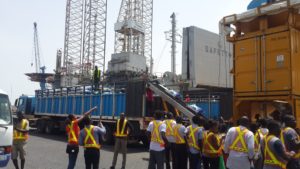The controversial full migration to Ghana’s the new UNIPASS international trade facilitation platform got off to an inauspicious start last week as the commencement of the new single window platform at Takoradi Port – the first effort to implement the system at a sea port after pilot exercises at land border posts – immediately encountered problems, even before the arrival of any cargo.
Many clearing agents were unable to register onto the platform last week, forcing UNIPASS officials to host an emergency meeting last Thursday with their representatives under the auspices of the Ghana Institute of Freight Forwarders, GIFF. At the meeting UNIPASS officials called for clearing agents unable to register onto the platform by themselves, to provide their documents so the platform officials could do it for them.
But even the emergency meeting itself faced a logistical problem as directives aimed at curbing the spread of the coronavirus epidemic restricted the meeting to not more than 25 people, thus leaving majority of the affected clearing agents un-represented.
Unsurprisingly, the clearing agents community were left underwhelmed. Edward Akrong, GIFF’s President told Goldstreet Business that they have every reason to worry, since the inability of many of them to register – coming on the back of a plethora of operational shortcomings which have forced several postponements of the new platform’s take off – provides a clear warning that its shortcomings are by no means resolved.
“If agents cannot even register on the platform, what are the chances that they will be able to use it to facilitate the clearing of goods.”
The emergent problems last week apparently justified government’s deliberate strategy to start the platform’s introduction from Takoradi port since it is mainly used for exporting bulk commodities, rather than for imports, in which Tema port overwhelmingly dominates, Thus Takoradi port has relatively low import cargo traffic, thus creating the opportunity to address operational problems as they arise without generating more negative publicity on the back of continuous bad press which the platform has been receiving since it was contracted by government in 2018 under a 10 year sole sourced contract.
Indeed, no ship is expected to berth at Takoradi port and its cargo cleared through the new platform until April 8, and the next ship arrival after that will be on April 19.

Over the past two years UNIPASS – which is to be operated by indigenous firm, Ghana Link and its South Korean partner, CUPEA – has been roundly criticized by most port operators and trade facilitation stakeholders, as well as public policy think tanks and commentators. They argue that fees charged by the new platform’s operators, at 0.75 percent of free on board cargo value are higher than the cumulative charges of 0.68 percent charged by GC Net and West Blue, the partnership that introduced an eminently successful single window, end to end platform in 2016, which has been uniformly hailed by the shipping community, clearing agents, ports authorities, public revenue agencies, public policy analysts and commentators alike.
More importantly, the new platform has not worked smoothly where it has been tried so far, forcing several postponements since the original scheduled take off date of January 1, 2019. Indeed, GIFF President Akrong points out that the recent pilot exercises were deliberately done only at land border points where cargo traffic is minimal and where cargo manifests do not need to be uploaded onto the platform, unlike at seaports and airports.
Curiously, clearing agents assert that not only are the documentations under the new platform exactly the same as those under the GC Net/West Blue platform; the replication has even inadvertently extended to the fees charged, with the new platform’s documents demanding payment of the same 0.40 percent fee charged by GC Net despite the UNIPASS fee being a much higher 0.75 percent ( the other 0.28 percent fee under the outgoing platform is paid to West Blue out of a 1.0 percent fee collected by government itself).
This appears to confirm the argument of GC Net that UNIPASS has simply cloned its platform; the problem being that it has not mastered how to use it. Indeed, GC Net and West Blue have sued UNIPASS at an Accra High Court for platform operating software piracy.
The latest problems at the Takoradi port are coming at a particularly bad time for UNIPASS. In March, IMANI Africa, a leading public policy think tank petitioned President Nana Akufo-Addo to abrogate the contract following revelations that Ghana Link’s wholly owned subsidiary, Africa Link, had a similar contract terminated by the Sierra Leone government in January for failing to deploy a single window trade facilitation platform after seven years of operations, coupled with corporate tsax evasion to the tune of 1.47 billion Leones.











